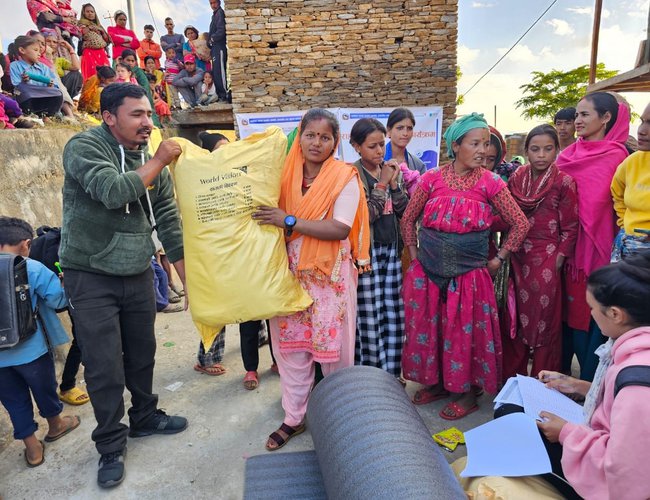
In the wake of the devastation in Jajarkot, World Vision International (WVI) Nepal has been responding to the dire needs by providing essential support to the families affected by the earthquake in close coordination with the government of Nepal.
As of 29 November 2023, WVI Nepal in partnership with the local NGO PanchtaraYuwaSamrakshakManch (PTYSM) have supported the affected families and children with 1000 sets of food and non-food shelter kitsalong with 648 sets of kitchen kits, 652 sets of winterization kits and 640 sets of hygiene kitsin grimly affected Nalgad Municipality and Bheri Municipality in Jajarkot to equip them with immediate relief support.A total of 500 sets of dignity kits are also being distributed this week to adolescent girls, and pregnant and lactating women. The food and non-food items have been supported through distribution programs since 5 November to ensure the well-being of the displaced population.
A total of 26,557 houses have endured complete damage thereby forcing several families to seek shelter in open spaces embracing the extreme cold nights in Jajarkot, West Rukum, and other neighboring districts. Besides private housing, the earthquake has also inflicted significant damage to school buildings and classrooms, bringing a halt to students’ education and uncertainty as to when classes will return to normalcy. Moreover, a number of health facilities and birthing centres were damaged by the quake resulting in interrupted regular health services. The need for health and nutrition services including Water, Sanitation, and Hygiene (WASH) increased but access decreased due to the damage.
As the distribution is ongoing in close coordination with the provincial and local governments, WVI Nepal has been emphasizing establishing temporary learning centers (TLC) to ensure that children can continue their education in a safe and conducive environment.
Theresponse will also be catering to WASH facilities, child-friendly spaces and temporary education facilities, school and health center reconstruction, and livelihood recovery for the most vulnerable - including children, senior citizens, women, and people with disability.
The emergency relief materials have enabled the affected and displaced households to rely on the support for their livelihood to improve their living conditions. Vulnerable groups including children, senior citizens, and people with disability are being supported with winterization kits to prevent the risk of illness brought on by the cold season.Children may require mental health and psychosocial support to cope with the trauma they have faced as some have lost both their parents while others have lost at least one parent or their homes.
- India’s External Affairs Ministry’s Senior Officials Says Indo-Nepal relations are ever expanding
- Jul 05, 2025
- Bhutan Government Unveils Three Pronged Strategies To Tackle Skilled Migration Crisis
- Jul 05, 2025
- Weather Forecast: Generally Cloudy Across The Country With Heavy Rain At One Or Two Places Bagmati And Koshi Provinces
- Jul 05, 2025
- FNCCI President Dhakal Urges British Companies to Invest in Nepal
- Jul 04, 2025
- Nepal Is Expected To See 60,000 People Infected with Dengue This Year
- Jul 04, 2025















